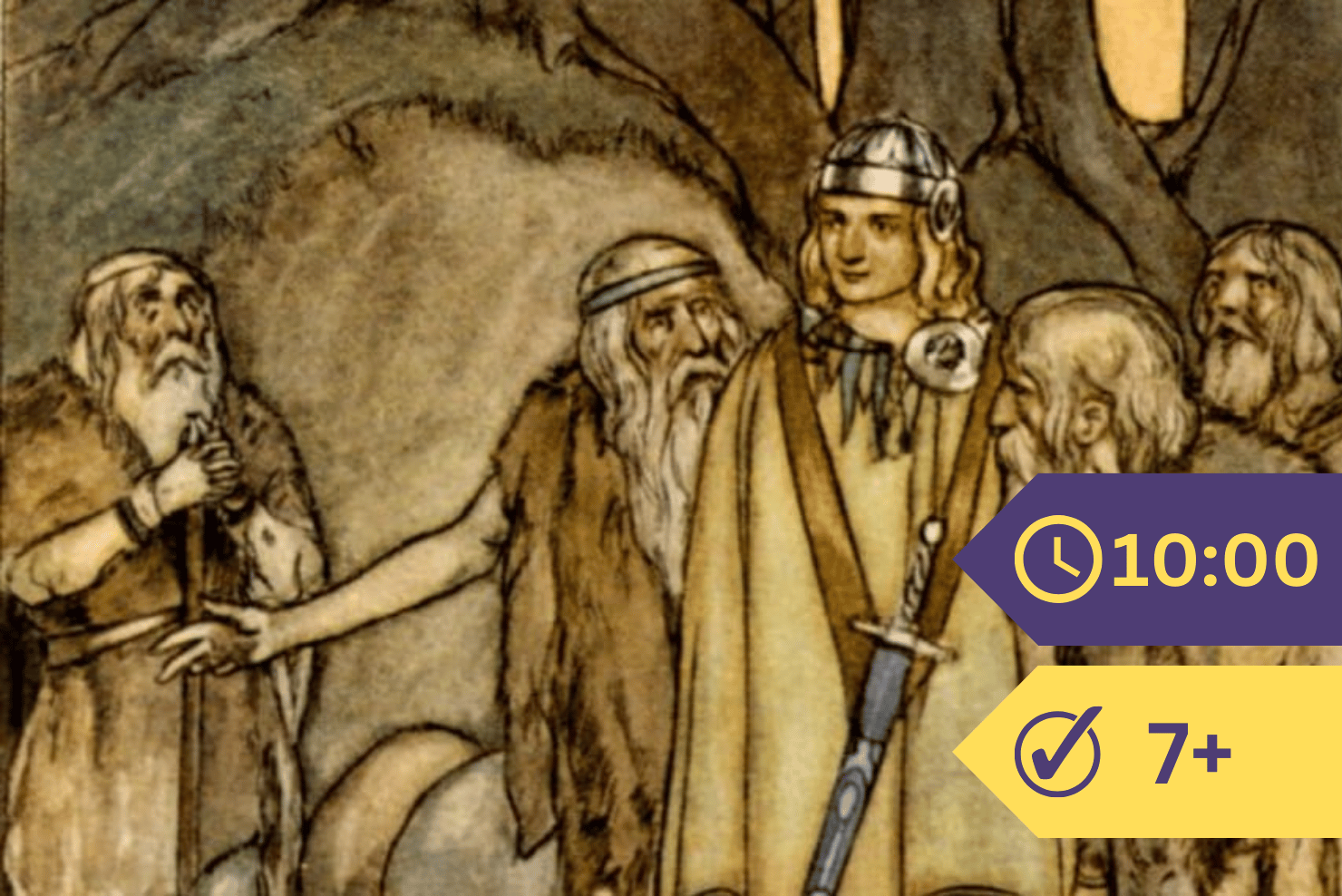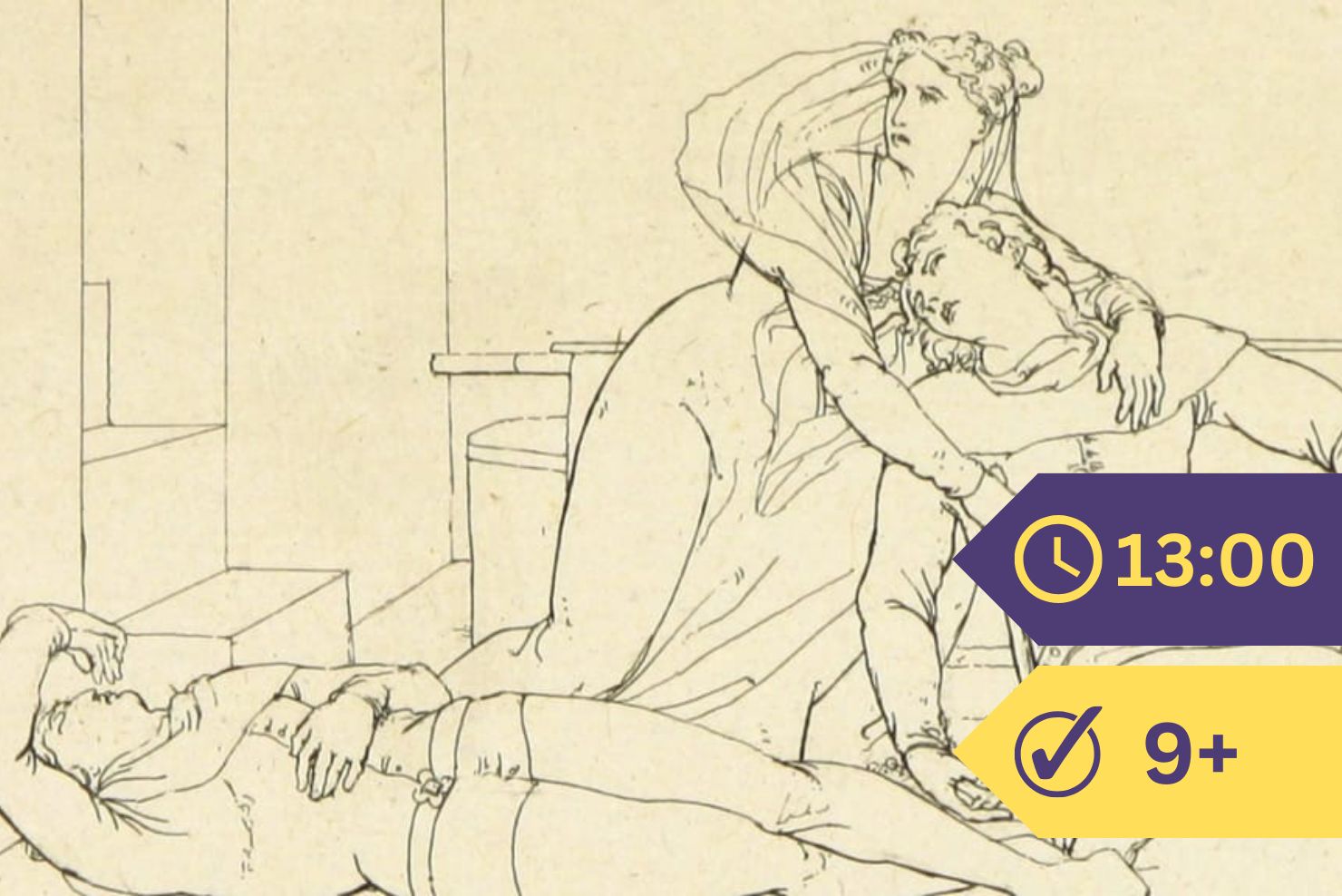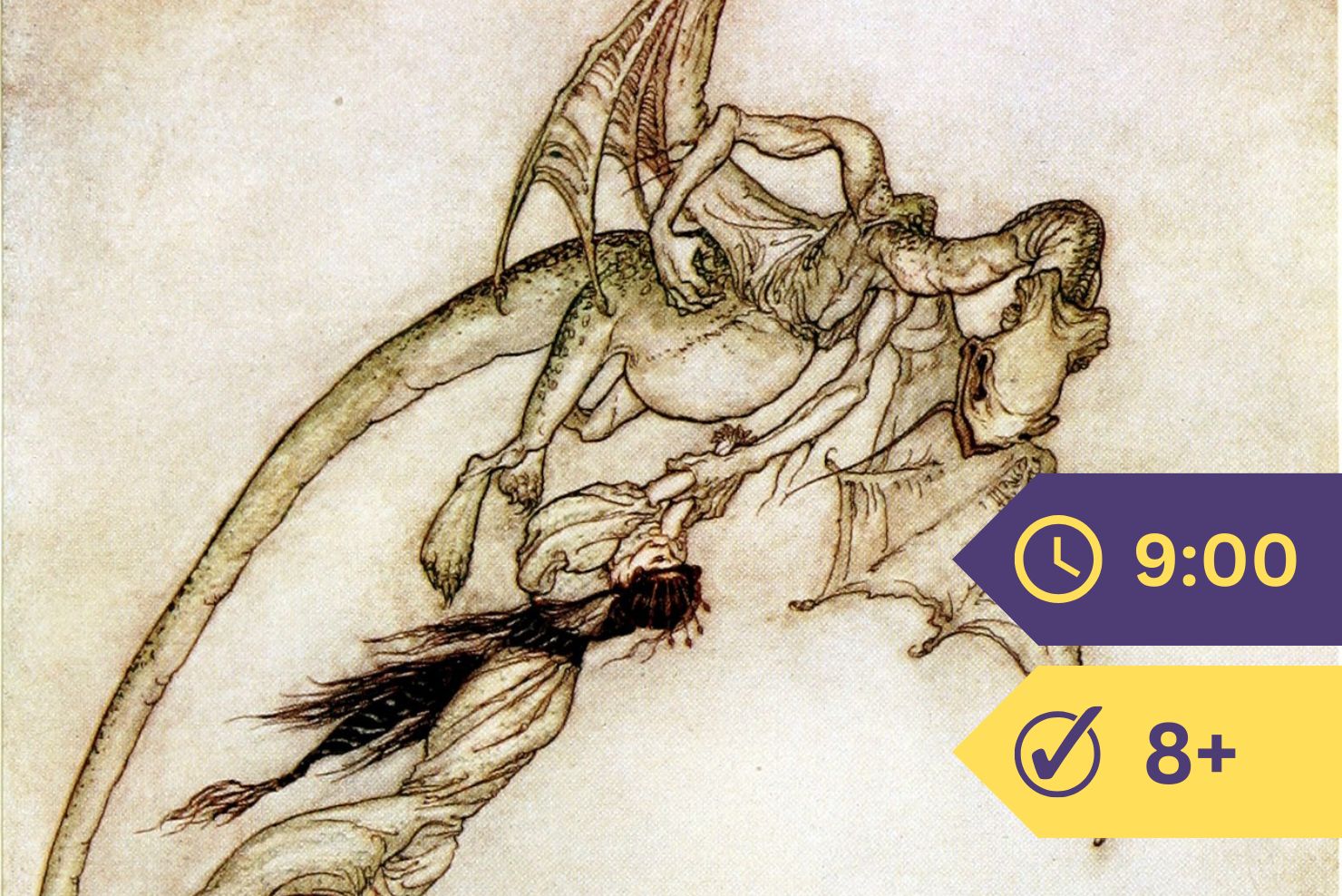As soon as Cardenio had finished his melancholy story, the curate was about to offer him some consolation, when he was stopped by hearing a mournful voice calling out: “Oh that I could find an end to this life of misery! Alas, how much more agreeable to me is the company of these rocks and thickets than the society of faithless man! Would that I had any one to advise me in difficulty, to comfort me in distress, or to avenge my wrongs!” This was overheard by the curate and all who were with him, and thinking that the person who spoke must be hard by, they went to search, and had not gone twenty paces when they saw behind a large rock a boy sitting under an ash-tree. He wore a peasant’s dress, but as he was bending down to wash his feet in the brook, his head was turned from them. They approached softly and without speaking, while his whole attention was employed in bathing his legs in the stream. They wondered at the whiteness and beauty of his feet, that did not seem formed to tread the furrows, or follow the cattle or the plough, as his dress seemed to suggest. The curate, who was ahead of the rest, made signs to them to crouch down, or hide themselves behind a rock. This done, they all gazed at the beautiful youth, who was clad in a grey jacket, and wore breeches and hose of the same cloth, with a grey hunting-cap on his head. Having washed his delicate feet, he wiped them with a handkerchief which he took out of his cap, and in doing so he raised his head, showing to those who were looking at him a face of such exquisite beauty that Cardenio murmured: “Since this is not Lucinda, it can be no earthly but some celestial being.”
The youth took off his cap, and, shaking his head, a wealth of hair, that Apollo might have envied, fell down upon his shoulders, and discovered to them all that the peasant was not only a woman, but one of the most delicate and handsome women they had ever seen. Even Cardenio had to admit to himself that only Lucinda could rival her in beauty. Her golden locks fell down in such length and quantity that they not only covered her shoulders, but concealed everything except her feet, and the bystanders more than ever desired to know who this mysterious beauty might be. Some one advanced, and at the noise the beauteous phantasy raised her head, and thrust aside her locks with both hands, to see what it was that had startled her. No sooner did she perceive them than she started up, and, without staying to put on her shoes or tie up her hair, seized her bundle, and took to flight full of alarm, but she had not run six yards when her delicate feet, unable to bear the roughness of the stones, failed her, and she fell to the ground.

They all ran to her assistance, and the curate, who was first, said: “Stay, madam, whosoever you are; those you see here have no desire to harm you, and there is therefore no necessity whatever for flight.”
To this she made no reply, being ashamed and confused, but the curate, taking her hand, continued in a kindly manner: “Madam, it can be no slight cause that has hidden your beauty in such an unworthy disguise, and brought you to this lonely place where we have found you. Let us at least offer you our advice and counsel in your distress, for no sorrow can be so great that kind words may not be of service. Therefore, madam, tell us something of your good or evil fortune, that we may help you in your troubles as best we can.”
At first, while the curate spoke, the disguised damsel stood rapt in attention, and gaped and gazed at them all as if she were some stupid villager, who did not understand what was said; but finding that the curate understood something of her secret, she sighed deeply, and said: “Since these mountains cannot conceal me, and my poor hair betrays my secret, it would be vain for me to pretend things which you could not be expected to believe. Therefore I thank you all, gentlemen, for your kindness and courtesy, and I will tell you something of my misfortunes, not to win your pity, but that you may know why it is I wander here alone and in this strange disguise.”
All this was said in such a sweet voice, and in so sensible a manner, that they again assured her of their wish to serve her, and begged that she would tell them her story.
To this she replied by putting on her shoes and binding up her hair, and seating herself upon a rock in the midst of her three hearers. Then, brushing away a few tears from her eyes, she began in a clear voice the story of her life.
“In the Province of Andalusia there is a certain town from which a great duke takes his name, which makes him one of our grandees, as they are called in Spain. He has two sons. The elder is heir to his estates, the younger is heir to I know not what, unless it be his father’s evil qualities. To this nobleman my parents are vassals, of humble and low degree, but still so rich that if nature had gifted them with birth equal to their wealth, I should have been nobly born, nor should I now have suffered these strange misfortunes. They are but farmers and plain people, and what they mostly prized was their daughter, whom they thought to be the best treasure they had. As they had no other child, they were almost too affectionate and indulgent, and I was their spoilt child. And as I was the mistress of their affection, so also was I mistress of all their goods. I kept the reckoning of their oil-mills, their wine-presses, their cattle and sheep, their beehives—in a word, of all that a rich farmer like my father could possess. I engaged and dismissed the servants, and was the stewardess of the estate. The spare hours that were left from the management of the farm I spent with the needle, the lace cushion, and the distaff, or else I would read some good hook or practise upon my harp.
“This was the life that I led in my father’s house. And though I seldom went abroad except to church, yet it seems I had attracted the eyes of the duke’s younger son, Don Fernando, for so he was called.”
No sooner did she mention the name of Don Fernando than Cardenio’s face changed colour, and the curate and barber noticing it, feared that he would burst out into one of his mad fits. But he did nothing but tremble and remain silent, and the girl continued her story.
“No sooner, then, had Don Fernando seen me than he was smitten with love for me, and from that moment I had no peace. I could not sleep for his serenades. I had numerous letters from him, full of declarations of love, and at last at his earnest entreaty we had many meetings. But though he talked much of love, yet I knew that his father would not allow him to marry the daughter of one of his own vassals, and my parents both assured me that the duke would never consent to our marriage.
“One evening Don Fernando gave me a beautiful ring, and promised that he would always be true to me, and from that moment I felt that I was betrothed to him, and that he really intended, in spite of the duke’s opposition, to make me his wife. For some days I lived in the greatest joy, and Don Fernando came constantly to see me, but after a while his visits grew less frequent, and at last ceased altogether, and I heard that he had gone on a visit to another city.
“I waited in hopes of receiving a letter from him, but none came. Ah, how sad and bitter those days and hours were to me, when I first began to doubt and even to disbelieve in my lover’s faith! I had to keep watch on my tears, and wear a happy face for fear my parents should find out the reason of my unhappiness. All this time of doubt, however, came to an end at an instant. For at last it was announced in the town that Don Fernando had married, in the city where he was visiting, a damsel of exceeding beauty and of very noble birth called Lucinda, and there were many strange tales told of their wedding.”
Cardenio, hearing the name of Lucinda, did nothing but shrug his shoulders, bow his head, and shed bitter tears. But yet, for all that, Dorothea, for such was the maiden’s name, did not interrupt the thread of her story, but continued.
“When this doleful news reached my ears, I was inflamed with rage and fury. I ordered one of my father’s shepherds to attend me, and without saying a word to my parents, I packed up some dresses and some money and jewels, and set off on foot for the city where Don Fernando had gone, that I might get from him at least some explanation of his wickedness. In two days and a half I arrived at my journey’s end, and the first person I asked told me the whole story of Don Fernando’s wedding. He told me that at the time of the wedding, after Lucinda had uttered her consent to be Fernando’s wife, she had fainted, and there fell from her bosom a letter written in her own hand, in which she said that she could not be the wife of Don Fernando, because she was betrothed to Cardenio, a gentleman of that city. The letter went on to say that she intended to kill herself at the end of the ceremony, and upon her was found a dagger, which seemed to bear out what she said. Don Fernando seeing this, and thinking that Lucinda had mocked him, would have stabbed her with the dagger had her parents not prevented him. After this, I was told, Don Fernando fled, and I learned that this Cardenio had been present at the wedding, and, hearing her words, had vanished from the city in despair, leaving a letter behind, declaring the wrongs Lucinda had done to him. The whole city were talking of these terrible things, and they talked the more when it was known that Lucinda was missing from her father’s house, and that her parents had almost lost their reason in their distress. When I heard all these things I made up my mind I would find Don Fernando, married or unmarried. But before I left the city on my search, I was told there was a proclamation made by the public crier, offering a large reward for any one who should bring me back to my parents. Fearing that this might tempt the shepherd to betray my whereabouts, I made my escape from the city, and in this disguise came to the Brown Mountains, where I have lived for some months with an old goatherd, and I help him to tend his goats. Here I have managed to pass as a peasant lad until my hair betrayed me to you gentlemen as what I am, a distressed and unfortunate maiden. This is indeed the true story of my tragedy, for which consolation is in vain, and relief, I fear me, impossible.”







